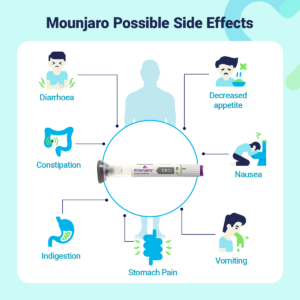Weight loss surgery is usually offered to those with a BMI of over 40.
It’s also available to those with a BMI of over 35 in the presence of a weight-related health condition.
Generally, those who undergo weight loss surgery haven’t managed to be successful with losing weight with diet, exercise, and medication.
As with all operations, weight loss and bariatric surgeries do come with their risks.
No surgical procedure is a risk-free one, for some people the risks of not having the operation outweigh the risks of the surgery itself.

Many people have great success with weight loss surgery and find that it’s what they needed to reset their relationship with food.
However, others regret their operation and find that it causes them problems.
This can sometimes depend on the type of weight loss surgery that was performed.
What type of weight loss surgeries are available?
Many people think of a gastric band when they think about bariatric surgery.
However, there are now several methods that can be used to reduce the size of the stomach.
All of these methods require general anaesthetic, so none of them are completely risk-free.
However, most weight-loss operations are now performed via keyhole surgery, so the incisions are often surprisingly small.
It isn’t just the actual surgery that people need to think about though.
Most of the time with weight loss operations, you’ll be required to stick to a strict diet in the weeks leading up to and following the surgery.
For a few weeks before you go under the knife, you’ll be asked to follow an LRD – or liver reduction diet.
Many people with excess weight have an enlarged liver which can make it difficult and even dangerous to complete the surgery.
Because of this, a dietician will likely ask you to follow a very strict diet in order to shrink the liver enough for surgery to go ahead.
After surgery, you’ll also be expected to follow another strict diet to let your stomach heal.
This usually includes a couple of weeks of liquid-only. This is followed by a puree stage, a soft food stage, and then finally back to a “normal” yet reduced diet.
This is incredibly important to follow as your stomach needs time to heal, by eating solid foods too soon you could cause yourself a lot of unnecessary discomforts.

Because of the gruelling diets, it’s often wise to ask yourself if you think you could handle it.
Part of the safety of weight loss surgery is in how you care for yourself before and after the operation.
If you go through the NHS for bariatric surgery, you’ll receive support and guidance through every stage.
Those that pay privately may need to source support themselves, so this is something to consider.
As well as the amount of dedication that’s needed for preparation and recovery, weight loss surgery can cause some medical issues such as:
- A leak in the gut during recovery (serious)
- Infected wounds
- A blocked gut (urgent)
- Malnutrition
- Gallstones (due to rapid weight loss)
- Excess skin (this can sometimes become sore and infected)
Whilst there’s no such thing as a “safe” surgery, there are various factors that can affect the risk.
For example, those with a larger BMI are more at risk than those with a smaller BMI.
It’s therefore recommended to try and reduce your weight before your surgery in order to reduce the risk of complications.
Many people choose to use medication during this time to help them to lose weight for the operation.
One great option is Semaglutide, which helps to reduce your appetite so that you eat less.
As well as consuming fewer calories, it can sometimes help those waiting for surgery to get used to smaller portions, which may help when it comes to eating post-surgery.
How safe is bariatric surgery?
As we’ve already mentioned, all surgeries come with risks.
This risk is increased if general anaesthetic is required, and it also increases with BMI.
Those that are at greater risk include those who:
- Have a BMI of over 50
- Have a risk factor for blood clots
- Are over 45
- Have high blood pressure
However, none of these individual factors would prevent you from having weight loss surgery.
If you go via the NHS, a team of multidisciplinary specialists will make a decision on whether or not bariatric surgery would be safe for you.
This is possibly the safest option, as many people will be involved in the decision-making process.
However, this doesn’t mean that it’s risk-free. It’s important to know that there’s a risk of death with any surgery.
Especially one that requires general anaesthesia. However, death in these circumstances is incredibly rare.
A study was published in 2017 that looked into the safety of bariatric surgery in England between 2009-2016.
Amongst other things, the researchers looked at the mortality rates of weight loss surgery in this period.
Out of a total of 41,241 surgeries over 7 years, 29 patients died in hospital (0.07%).
They also looked at the 30-day mortality rate after being discharged from the hospital.
In the 30 days after leaving the hospital post-surgery, 32 patients died (0.08%).
Essentially, this means that the overall mortality rate of bariatric surgery was 0.15%.
This is generally a fairly low mortality rate when you consider the anaesthesia and increased BMI of patients undergoing operations.
Is Bariatric surgery safe long-term?
There can be some long-term complications of bariatric surgery, such as the risk of dumping syndrome.

Dumping syndrome happens when food moves into the first part of your small intestine too quickly.
It can be a fairly common side effect of weight loss surgery.
Essentially, the digestive process moves too fast in some places which can cause symptoms like:
- Nausea
- Stomach cramps
- Diarrhoea
- Vomiting
- Flushing
- Dizziness
- Fast heart rate
Unfortunately, there’s no way of knowing if you’ll be affected by dumping syndrome (or any trigger foods) unless it happens to you after surgery.
However, it’s a good idea to avoid overly sugary or fatty foods as this may increase your risk of experiencing dumping syndrome.
Each type of bariatric surgery carries its own risks with it, but it can change many peoples’ lives for the better.
For a lot of people, bariatric surgery improves their life in the long term due to it causing a reduction in weight.
This can also reduce the risk of several serious medical conditions such as type 2 diabetes, cardiovascular disease, stroke, heart attack, and many more.
Some of the long-term safety of weight loss surgery is down to you and how well you prepare for your recovery.
We would recommend joining support groups to find hints and tips from people that have already had the surgery.
As well as this, we would also recommend speaking with a doctor or specialist about any questions you might have regarding weight-loss operations.
Bariatric surgery can be safe in the long term if you take the right precautions, but it’s not for everyone.
There are alternatives to weight loss surgery if you don’t think it’s the right thing for you.
Many people are turning to medicines such as Semaglutide to take on a long-term basis instead of going through surgery.
Many people see it as superior to weight loss surgery to the lack of risk that comes with an operation, but weight loss with medication can take longer.
However, a more gradual weight loss is often recommended as it’s more likely to be sustainable.
We’d recommend speaking to a medical professional about your options when it comes to weight loss.
Generally, surgery is only offered to those that have tried all other options without success.
If you haven’t yet tried weight loss medications, we’d certainly recommend giving them a go before considering an operation.


















